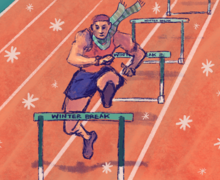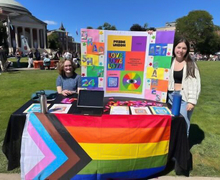‘Defending Banned Books’ guest authors talk censorship, politics
Sean Sterling | Staff Photographer
Julie Berry and Seamus Kirst discuss their personal experiences with censorship and why their own books got banned. 4,240 books with themes surrounding the LGBTQ+ community and racism got banned in 2023.
Get the latest Syracuse news delivered right to your inbox.
Subscribe to our newsletter here.
A Syracuse University student-led panel hosted authors Julie Berry and Seamus Kirst for a discussion about the political implications of book banning and censorship
Throughout Tuesday night’s “Read Between the Lines: Defending Banned Books” discussion, both authors shared their personal experiences with literary censorship and said the reasons for book removal often mask deeper political and social tensions. The event was organized by members of SU’s CAS 100: Religion, Science and Politics course.
“I think there are people being force fed this nonsense rhetoric about dangers that don’t really exist, and they’re rising up in this righteous, protective parental angst to try to take action. How do we move the conversation past (this)?” Berry said. “It’s getting us nowhere.”
Berry’s historical fiction novel about World War I, “Lovely War,” was one of over 1,600 books Florida’s Escambia County School District pulled from its library shelves for containing “sexually explicit” content. Berry said her book was targeted for its frank examination of racism; while its sexual content wasn’t vital to the plot, the racist treatment depicted in the American military was, she said.
Kirst, who is an SU alum, is the author of the picture book, “Papa, Daddy, and Riley,” which tells the story of a young girl being raised by two fathers. The book has faced bans as a result of its “LGBTQIA+ themes,” Kirst said. He said the ongoing pattern of censorship targeting books that address diversity and social justice topics is alarming.
“As (a) gay writer … I don’t think (bans are) going to be helpful for the types of books that I’m interested in writing,” Kirst said. “It’s just another place that we just have to keep creatively and persistently pushing back on, because it’s objectively incredibly unconstitutional.”
Berry and Kirst said their experiences exemplify a national trend of books that address complex social issues facing increased scrutiny and removal from school shelves.
There were 4,240 books banned in 2023, according to the American Library Association. These bans primarily targeted books with themes surrounding LGBTQ+ identities and racism, as well as other social and political topics.

Sean Sterling | Staff Photographer
Students ask Berry and Kirst about their experiences and why they believe books get banned.
Both authors said censorship through literature is a problematic reflection of the country’s current political state. When asked, “Why are books banned?,” both panelists discussed the importance of not being deterred by bans and how to fight the overarching issues they contribute to.
Berry said she is a “proudly progressive person” and doesn’t let the banning of her books discourage her.
“I think I’m better off, and I think I’m more impactful, producing my next book and letting that be successful…,” Berry said. “If I can write a book that sells a lot of copies, that’s more noise that I’ve made, right? That’s more impact, that’s more power that I’ve gained.”
Kirst told attendees that people affected by book bans can find community with others who are affected by similar censorship. He said it’s important to come together and raise awareness.
Following the panel, moderators split the attendees into teams to play a trivia game about banned books from different categories, like children’s books, religious books and young adult books, including both fiction and non-fiction.
Daisy Polowetzky, an SU sophomore, said the authors’ resilience resonated with her. She said it stuck out to her how, despite book bans and censorship, the authors never felt afraid to continue publishing stories.
Sofia Floresca, another sophomore, said the 2024 election cycle and reasons why these books were banned raises political questions. She said the panel shows the importance of these issues and how they personally affect people.
“The issue is something that is never going to go away and it has existed for years before,” Polowetzky said. “We really have to create conversation on both sides in order to make any progress.”
Published on November 20, 2024 at 1:18 am
Contact Chloe: cfrinka@syr.edu






